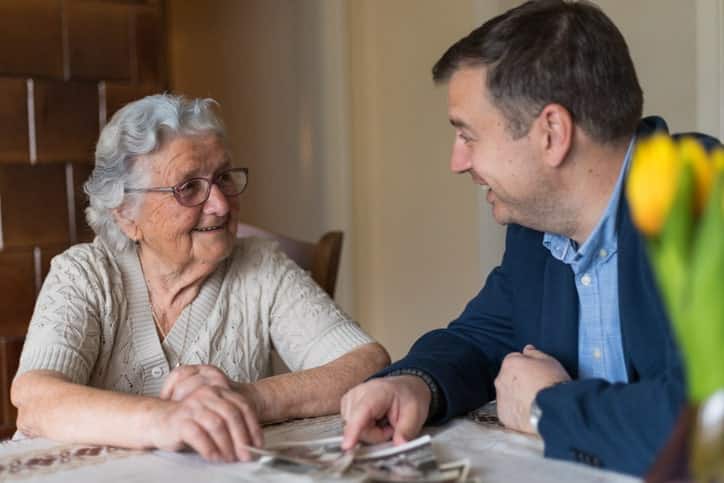The do’s and don’ts of visiting someone with Alzheimer’s

When someone you love is diagnosed with Alzheimer’s, the diagnosis affects the entire family. The majority of people who have Alzheimer’s eventually move into a specialized assisted living facility where they have around-the-clock medical care and supervision, because as much as you’d like your loved one to remain at home, there are limits to the home care you can provide. Plus, once Alzheimer’s advances to a certain stage, your loved one will need to be cared for by trained specialists.
Visiting someone with Alzheimer’s can be a difficult experience, especially if your loved one is in the more advanced stages of the disease. At UMC, our memory care specialists have years of experience in caring for people with Alzheimer’s, so we have put together this guide with some key do’s and don’ts to help you during your visits. If you have any questions please contact our Tapestries memory care team today.
The do’s
Stay positive. We understand this is often easier said than done, but really focus on staying positive during your visit. Be mindful of the language you use, your tone of voice, and your body language. If you walk in with your arms crossed and speak in a harsh tone of voice, for example, you aren’t conveying a sense of positivity and openness with your loved one.
Maintain eye contact. Hold their gaze while you’re talking, and be patient if it takes them a little bit to reply. People with Alzheimer’s sometimes struggle to find the words they’re looking for, but keep eye contact to let them know you’re listening.
Let them lead. Your loved one may feel like talking and engaging in certain activities, or they may want to simply sit in silence with you. Follow their lead while spending time together and don’t try to force them to do things or to speak with you.
Share some memories. Talking about old times is a great way to trigger their memory, and to help them connect with a part of their life that they may remember.
Be prepared for out-of-character behavior. People with Alzheimer’s often exhibit behaviors including aggressiveness, confusion, and frustration. You can imagine it’s very upsetting to not be able to remember who you are, where you are, and important details about your life. Don’t take this behavior personally, and instead try to understand where they are coming from.
The don’ts
Don’t argue. Quibbling back and forth over information they’re wrong about isn’t helpful or productive for your loved one. Instead, it may make them feel embarrassed or angry. Rather than correcting them, simply let it go and move on.
Don’t overstimulate your loved one. This includes bright lights, loud music, turning the TV up too loudly, and talking too loudly. People with Alzheimer’s need calm, tranquil environments where they can feel at peace.
Don’t assume they remember your previous visits. Your loved one will likely go through various stages of clarity, but don’t reference your previous visits with the expectation that they will remember.
Don’t say things like “Do you remember?” As mentioned above, people with Alzheimer’s often feel stressed, confused, and upset because they can’t recall core details about themselves and their lives. Asking if they remember something can be triggering for them. Instead, we recommend you explain the topic as if it’s the first time they are hearing about it.
Memory Care at UMC
If you’d like more information about caring for or visiting someone with Alzheimer’s, or if you have any questions, please contact our team at UMC today. We look forward to hearing from you.





